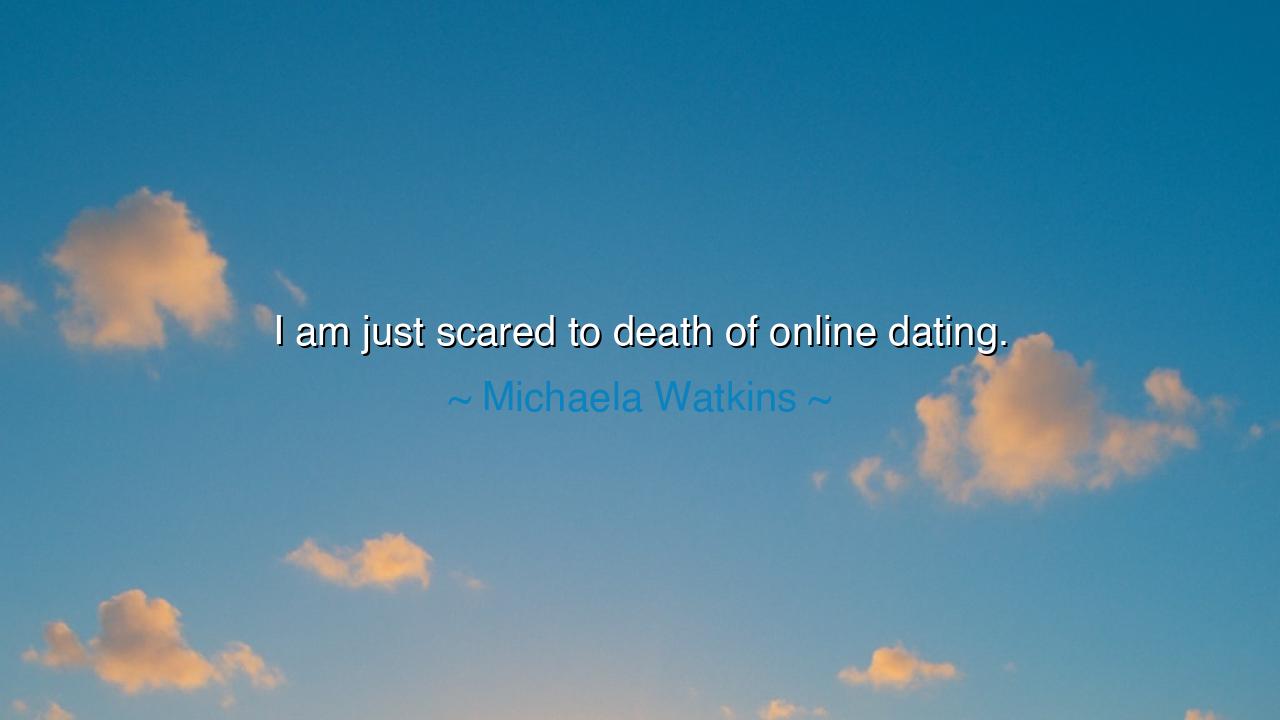
I am just scared to death of online dating.






In the lantern-light of confession, Michaela Watkins speaks a slender, shaking truth: “I am just scared to death of online dating.” Hear the tremor and the wisdom braided together. The phrase is plain as bread, yet it carries the pressure of a thousand unseen judgments—avatars that stare without eyes, messages that vanish without farewell, choices that multiply until meaning thins. To be scared is not to be weak; it is to acknowledge that certain doors hum with unfamiliar electricity. The ancients would say: name the dragon before you lift your shield.
Let us parse the heart of this fear. Online dating compresses the long, human rituals of courtship—introductions, shared spaces, reputations earned in community—into a fast theater of swiping, silhouettes, and sudden declarations. It asks the soul to move by symbol where it prefers substance, by glimpses where it prefers presence. In such a realm, the self can feel both exposed and erased: exposed to scrutiny without context, erased by an algorithm that hums on even as your breath catches. No wonder a spirit whispers, “scared to death.” It is not the other person alone that frightens; it is the machinery between you.
Yet fear, rightly handled, can be a teacher rather than a jailer. The confession “I am scared” is the first step in apprenticeship: it invites skill, boundary, and pace. The elders of any craft began with trembling—sailors before the open sea, scribes before a blank scroll, warriors before the city gate. They did not shame the tremor; they shaped it. To treat online dating as a craft means learning what the tool can do, what it breaks, and how to keep your soul from becoming its fuel.
A story to stitch flesh to the thought. A friend—call her Sara—entered the digital bazaar with a brave profile and a brittle heart. After a week of silence and one unkind comment, she felt the old panic rise: scared to death, indeed. A wiser friend suggested a change: shrink the arena and thicken the context. Sara shifted to communities that verified identity, set a strict cadence (two conversations, then a short video chat, then a coffee in daylight), and kept a “council of three” who knew every plan and checked every feeling. The fear did not vanish, but it became proportionate. Months later she met a man whose messages were consistent, whose actions matched his words. Craft had turned fear into prudence—and prudence into a path.
History offers an older mirror. In the days of letters and salons, Jane Austen’s world still swirled with anxiety: reputations could be misread, intentions hidden, hearts bruised by rumor. Communities acted as slow algorithms, introducing, filtering, vouching. The speed was different; the vulnerability was not. Our age stripped away the village and kept the longing. To be scared is to sense the loss of the village’s guardrails. To be wise is to rebuild them deliberately—through verification, shared spaces, and the counsel of trusted eyes.
So what lesson shall we pass to those who tremble at this threshold? First, honor your fear; it is information, not indictment. Second, refuse the false binary of “bravado or exile.” You may enter the digital gate on terms that keep your dignity: fewer platforms, tighter settings, slower steps. Third, remember that dating is not a performance but discernment. The aim is not to impress the many, but to recognize the one—and to do so without misplacing your self-respect along the way.
Practical rites for a steadier passage: (1) Write a safety creed in advance—non-negotiables for identity verification, meeting locations, and communication boundaries. (2) Set a rhythm: brief message exchange → quick video call → short public meet; never invert the order. (3) Keep a witness circle—two or three friends who see screenshots, know plans, and debrief outcomes; let their calm steady your pulse. (4) Use context-rich spaces—interest-based groups, volunteer projects, or curated communities—so you meet people as more than portraits. (5) Measure by consistency over charm: alignment between words, timing, and follow-through. (6) Hold to a Sabbath from the app each week; let silence clear your intuition. Do these, and the cry “scared to death” will soften into “rightly careful,” and online dating will become not a haunted corridor but a navigable street—one more road on which a brave heart may walk toward a worthy meeting.






AAdministratorAdministrator
Welcome, honored guests. Please leave a comment, we will respond soon